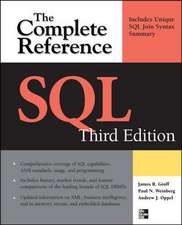Mathematical Foundations of Big Data Analytics
Autor Vladimir Shikhman, David Mülleren Limba Engleză Paperback – 12 feb 2021
In this textbook, basic mathematical models used in Big Data Analytics are presented and application-oriented references to relevant practical issues are made. Necessary mathematical tools are examined and applied to current problems of data analysis, such as brand loyalty, portfolio selection, credit investigation, quality control, product clustering, asset pricing etc. – mainly in an economic context. In addition, we discuss interdisciplinary applications to biology, linguistics, sociology, electrical engineering, computer science and artificial intelligence. For the models, we make use of a wide range of mathematics – from basic disciplines of numerical linear algebra, statistics and optimization to more specialized game, graph and even complexity theories. By doing so, we cover all relevant techniques commonly used in Big Data Analytics.
Each chapter starts with a concrete practical problem whose primary aim is to motivate the study of a particular Big Data Analytics technique. Next, mathematical results follow – including important definitions, auxiliary statements and conclusions arising. Case-studies help to deepen the acquired knowledge by applying it in an interdisciplinary context. Exercises serve to improve understanding of the underlying theory. Complete solutions for exercises can be consulted by the interested reader at the end of the textbook; for some which have to be solved numerically, we provide descriptions of algorithms in Python code as supplementary material.This textbook has been recommended and developed for university courses in Germany, Austria and Switzerland.
Preț: 224.43 lei
Preț vechi: 280.54 lei
-20% Nou
Puncte Express: 337
Preț estimativ în valută:
42.95€ • 45.04$ • 35.81£
42.95€ • 45.04$ • 35.81£
Carte tipărită la comandă
Livrare economică 07-21 ianuarie 25
Preluare comenzi: 021 569.72.76
Specificații
ISBN-13: 9783662625200
ISBN-10: 3662625202
Pagini: 230
Ilustrații: XI, 273 p. 53 illus., 21 illus. in color. Textbook for German language market.
Dimensiuni: 168 x 240 x 31 mm
Greutate: 0.41 kg
Ediția:1st ed. 2021
Editura: Springer Berlin, Heidelberg
Colecția Springer Gabler
Locul publicării:Berlin, Heidelberg, Germany
ISBN-10: 3662625202
Pagini: 230
Ilustrații: XI, 273 p. 53 illus., 21 illus. in color. Textbook for German language market.
Dimensiuni: 168 x 240 x 31 mm
Greutate: 0.41 kg
Ediția:1st ed. 2021
Editura: Springer Berlin, Heidelberg
Colecția Springer Gabler
Locul publicării:Berlin, Heidelberg, Germany
Cuprins
Preface.- 1 Ranking.- 2 Online Learning.- 3 Recommendation Systems.- 4 Classification.- 5 Clustering.- 6 Linear Regression.- 7 Sparse Recovery.- 8 Neural Networks.- 9 Decision Trees.- 10 Solutions.
Recenzii
“This book is apt for courses that introduce the fundamentals of data science/big data analytics at the graduate level. … The book can be used in courses devoted to the foundational mathematics of data science and analytics. It should be noted that sound mathematical knowledge … is required for reading. The case studies and exercises make it a quality teaching material.” (Bálint Molnár, Computing Reviews, August 19, 2022)
“Mathematical foundations of big data analytics is a very welcome and timely addition to the growing area of big data analytics. … Mathematical foundations are very carefully covered in each chapter, which justifies the title. There is a good listing of references for further study, as well as an index for easy reference. This book could be the basis for a one-semester graduate level course with an emphasis on mathematical foundations, supplemented by good programming projects.” (S. Lakshmivarahan, Computing Reviews, July 5, 2021)
“Mathematical foundations of big data analytics is a very welcome and timely addition to the growing area of big data analytics. … Mathematical foundations are very carefully covered in each chapter, which justifies the title. There is a good listing of references for further study, as well as an index for easy reference. This book could be the basis for a one-semester graduate level course with an emphasis on mathematical foundations, supplemented by good programming projects.” (S. Lakshmivarahan, Computing Reviews, July 5, 2021)
Notă biografică
Vladimir Shikhman is a professor of Economathematics at Chemnitz University of Technology.
David Müller is one of his doctoral students.
Textul de pe ultima copertă
In this textbook, basic mathematical models used in Big Data Analytics are presented and application-oriented references to relevant practical issues are made. Necessary mathematical tools are examined and applied to current problems of data analysis, such as brand loyalty, portfolio selection, credit investigation, quality control, product clustering, asset pricing etc. – mainly in an economic context. In addition, we discuss interdisciplinary applications to biology, linguistics, sociology, electrical engineering, computer science and artificial intelligence. For the models, we make use of a wide range of mathematics – from basic disciplines of numerical linear algebra, statistics and optimization to more specialized game, graph and even complexity theories. By doing so, we cover all relevant techniques commonly used in Big Data Analytics.
Each chapter starts with a concrete practical problem whose primary aim is to motivate the study of a particular Big Data Analytics technique. Next, mathematical results follow – including important definitions, auxiliary statements and conclusions arising. Case-studies help to deepen the acquired knowledge by applying it in an interdisciplinary context. Exercises serve to improve understanding of the underlying theory. Complete solutions for exercises can be consulted by the interested reader at the end of the textbook; for some which have to be solved numerically, we provide descriptions of algorithms in Python code as supplementary material.This textbook has been recommended and developed for university courses in Germany, Austria and Switzerland.
The authors
Vladimir Shikhman is a professor of Economathematics at Chemnitz University of Technology. David Müller is one of his doctoral students.
Caracteristici
Covers all relevant techniques commonly used in Big Data Analytics? Standardized structure and size of the chapters: motivation, results, case-study, exercises Recommended and developed for university courses in Germany, Austria and Switzerland Provides complete solutions for the exercises




























